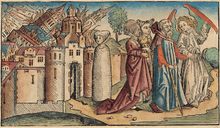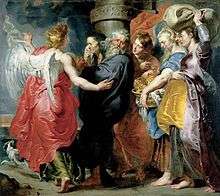LGBT history in Germany
This is a list of events in lesbian, gay, bisexual and transgender (LGBT) history in Germany.
Medieval and early modern periods
- 1007 – The Decretum of Burchard of Worms equates homosexual acts with other sexual transgressions such as adultery and argues, therefore, that it should have the same penance (generally fasting).[1]

"Sodom and Gomorrah" from the Nuremberg Chronicle by Hartmann Schedel, 1493.
- 1493 -- Hartmann Schedel illustrates Sodom and Gomorrah in Nuremberg Chronicle. The Book of Genesis 18 and 19 describes the destruction of Sodom as punishment for homosexuality.
_-_Google_Art_Project.jpg)
Albrecht Dürer, Lot and His Daughters
- 1499 Albrecht Dürer paints "Lot (biblical person) and Lot's daughters" escaping Sodom and Gomorrah during its downfall due to homosexuality.
- 1532 – Holy Roman Empire makes sodomy punishable by death.[1]
Seventeenth-Century

The Flight of Lot and His Family from-Sodom by Peter Paul Rubens,1613-15.
- 1615 -- Peter Paul Rubens paints "The Flight of Lot and his Family from Sodom."
- 1620 – Brandenburg-Prussia criminalizes sodomy, making it punishable by death.[1]
Eighteenth Century
- 1721 – Catharina Margaretha Linck is executed for female sodomy in Germany.
- 1794 – The Kingdom of Prussia abolishes the death penalty for sodomy.[1]
- 1798 -- The German language terms, knabenschander and knabenschanderren, are used to describe homosexuality.[2]
- 1799 -- The German term, stumme sunden, is used to describe homosexuality.[3]
19th century
- 1852 – Johann Ludwig Casper writes an article about homosexuality known under the title, Über Nothzucht und Päderastie und deren Ermittlung Seitens des Gerichtsarztes.[4]
- 1854 – Wilhelm Gollmann writes about homosexuality in the Homeopathic Guide to all Diseases Urinary and Sexual Organs.[5]
- 1859 – Arthur Schopenhauer briefly writes about homosexuality in the chapter on the Metaphysics of Love in his third edition of The World as Will and Representation.[6]
- 1864 – Karl Heinrich Ulrichs, a lawyer, confesses under the pseudonym, Numa Numantius, his secret transgender inclinations in his book, Forschungen über das Räthsel der mannmännlichen Liebe (Researches on the Riddle of Male-Male Love). He proposes a concept of transgender identity through the term, urning.[7]
- 1864 – Johann Ludwig Casper dedicated his third chapter on homosexuality in the first part of the Special Divisions section in the third edition (third volume) of A Handbook of the Practice of Forensic Medicine.[8]
- 1867 – On August 29, 1867, Karl Heinrich Ulrichs became the first self-proclaimed homosexual to speak out publicly for homosexual rights when he pleaded at the Congress of German Jurists in Munich for a resolution urging the repeal of anti-homosexual laws.
- 1869 – The term "homosexuality" appears in print for the first time in a German-Hungarian pamphlet written by Karl-Maria Kertbeny (1824–1882).
- 1870 – Friedrich Christian Oppenhoff mentions Paragraph 175 in Das Strafgesetzbuch für den Norddeutschen Bund.[9]
- 1871 – Homosexuality is criminalized throughout the German Empire by Paragraph 175 of the Reich Criminal Code.[10]
20th century
1901–1930
- 1907 – Adolf Brand, the activist leader of the Gemeinschaft der Eigenen, working to overturn Paragraph 175, publishes a piece "outing" the imperial chancellor of Germany, Prince Bernhard von Bülow. The Prince sues Brand for libel and clears his name; Brand is sentenced to 18 months in prison.[11]
- 1907–1909 – Harden-Eulenburg Affair in Germany[12]
- 1919 – In Berlin, Germany, Doctor Magnus Hirschfeld co-founds the Institut für Sexualwissenschaft (Institute for Sex Research), a pioneering private research institute and counseling office. Its library of thousands of books was destroyed by Nazis in May, 1933.[13][14][15]
- 1919 - Different from the Others, one of the first explicitly gay films, is released. Magnus Hirschfeld has a cameo in the film and partially funded its production.
- 1929 - On October 16, a Reichstag Committee votes to repeal Paragraph 175. The Social Democrats and other leftist parties backed the repeal, while the Catholic Center party and other right-wing parties opposed the repeal. The Nazis' rise to power prevents the implementation of the vote.
1931–1970
- 1931 - Mädchen in Uniform, one of the first explicitly lesbian films and the first pro-lesbian film, is released.

Students of the Deutsche Studentenschaft, organized by the Nazi party, parade in front of the Institute for Sexual Research in Berlin on May 6, 1933; they later attacked it, looting the archives, and setting afire much of the material
- 1933 – The National Socialist German Workers Party bans homosexual groups. Homosexuals are sent to concentration camps. Nazis burn the library of Magnus Hirschfeld's Institute for Sexual Research, and destroy the Institute
- 1937 – The first use of the pink triangle for gay men in Nazi concentration camps.
- 1945 – Upon the liberation of Nazi concentration camps by Allied forces, those interned for homosexuality are not freed, but required to serve out the full term of their sentences under Paragraph 175
- 1950 - East Germany partially abrogates the Nazis' emendations to Paragraph 175.
- 1968 – Paragraph 175 is eased in East Germany decriminalizing homosexual acts over the age of 18[10]
- 1969 - Paragraph 175 is eased in West Germany.[10]
1971–2000
- 1974 - General Gay Association, the second openly LGBT rights organization in German history, is established.
- 1985 - Herbert Rusche becomes the first openly gay member of the Bundestag.
- 1987 - Jutta Oesterle-Schwerin becomes the first lesbian member of the Bundestag.
- 1994 - After German reunifaction, the Supreme Court rules that the age of consent for sex must be equalized.
- 2000 - The Bundestag officially apologizes to gays and lesbians persecuted under the Nazi regime, and for "harm done to homosexual citizens up to 1969".
21st century
- 2001 - Germany recognizes civil partnerships for same-sex couples (without joint adoption until Oct 2004, then with step-adoption); Klaus Wowereit becomes the first openly gay politician elected mayor of Berlin (and, by virtue of Berlin's status as a state, one of the two first openly gay premier of a German state; also makes Berlin the largest city in the world with an openly gay mayor); Ole von Beust becomes the first openly gay mayor of Hamburg.
- 2004 - same-sex stepchild adoption is legalized; Guido Westerwelle, leader of the FDP, becomes the first leader of a major party to come out.
- 2009 - Westerwelle becomes the first openly gay member of the Federal Cabinet (Vice Chancellor and Foreign Minister under Angela Merkel coalition government).
- 2013 Barbara Hendricks becomes first openly lesbian member of the Federal Cabinet (Federal Minister for the Environment, Nature Conservation and Nuclear Safety under Angela Merkel coalition government)
- 2017 - In June 2017 the pardoning men convicted in the postwar era under Paragraph 175 was passed by law in the Bundestag. One week later, a majority of Bundestag MPs voted in favor of a bill legalizing same-sex marriage and granting homosexual couples full adoption rights.
See also
References
- 1 2 3 4 (Fone, 2000)
- ↑ Ebers, John (1798). The New and Complete Dictionary of the German and English Languages, Composed Chiefly after the German Dictionaries of Mr. Adulung & of Mr. Schwan. Vol. II. Brietkopf and Haertel.
- ↑ Ebers, John (1799). The New and Complete Dictionary of the German and English Languages, Composed Chiefly after the German Dictionaries of Mr. Adulung & of Mr. Schwan. Vol. III. Brietkopf and Haertel.
- ↑ Casper, Johann Ludwig (1852). Über Nothzucht und Päderastie und deren Ermittlung Seitens des Gerichtsarztes. Vierteljahrsschrift für gerichtliche und öffentliche Medicin. Unter Mitwirkung der Königlichen wissenschaftlichen Deputation für das Medicinalwesen im Ministerium der geistlichen, Unterrichts- und Medicinal-Angelegenheiten.
- ↑ Gollmann, Wilhelm (1854). Homeopathic Guide to all Diseases Urinary and Sexual Organ. Charles Julius Hempel. Rademacher & Sheek.
- ↑ Schopenhauer, Arthur (1909). The World as Will and Representation. Richard Haldane, 1st Viscount Haldane and J. Kemp. Charles Kegan Paul, Trench, Trübner & Company.
- ↑ Ulrichs, Karl Heinrich (1864). Forschungen über das Räthsel der mannmännlichen Liebe, Volume 1. Self-published; sold by Heinrich Matthes.
- ↑ Casper, Johann Ludwig (1864). A Handbook of the Practice of Forensic Medicine. Edition III. George William Balfour. The New Sydenham Society.
- ↑ Oppenhoff, Friedrich Christian (1870). Das Strafgesetzbuch für den Norddeutschen Bund. Bundesgesetzblatt des Norddeutschen Bundes Band 1870, Nr. 16, Seite 197–273.
- 1 2 3 "Where is it illegal to be gay?". BBC News. Retrieved 11 February 2014.
- ↑ Marc Vargo. Scandal: infamous gay controversies of the twentieth century Routledge, 2003. pp 165–7.
- ↑ Steakley, James D. (revised 1989). "Iconography of a Scandal: Political Cartoons and the Eulenburg Affair in Wilhelmin Germany", Hidden from History: Reclaiming the Gay & Lesbian Past (1990), Duberman, et al., eds. New York: Meridian, New American Library, Penguin Books. ISBN 0-452-01067-5.
- ↑ hirschfeld.in-berlin.de, The first Institute for Sexual Science
- ↑ Famous GLBT & GLBTI People - Dr. Magnus Hirschfeld stonewallsociety
- ↑ Atina Grossmann. Reforming Sex. Oxford University Press, 1995.
This article is issued from
Wikipedia.
The text is licensed under Creative Commons - Attribution - Sharealike.
Additional terms may apply for the media files.